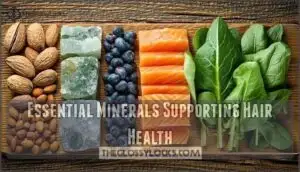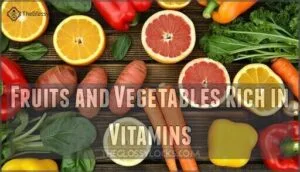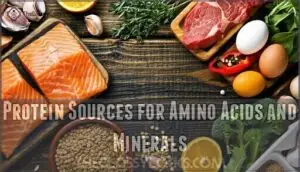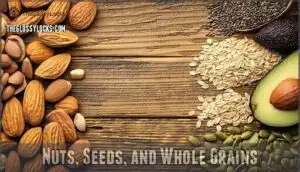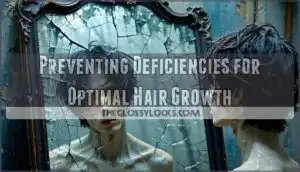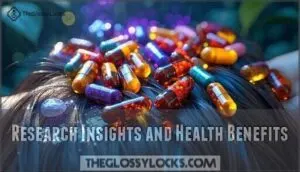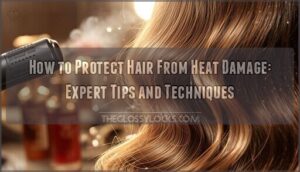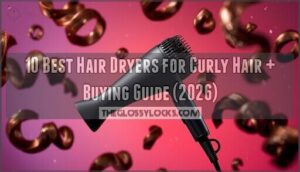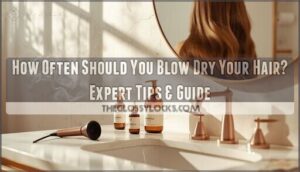This site is supported by our readers. We may earn a commission, at no cost to you, if you purchase through links.
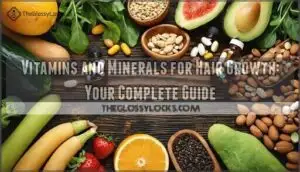
The problem is that deficiencies often hide behind everyday habits—skipping meals, restrictive diets, or simply not eating enough variety. Your scalp cells replicate faster than almost any tissue in your body, which means they’re particularly hungry for the right fuel.
Understanding which nutrients matter most and where to find them gives you a clear path to stronger, healthier hair growth without guessing or wasting money on supplements you don’t need.
Table Of Contents
Key Takeaways
- Your hair follicles replicate faster than almost any other tissue in your body, making them highly dependent on a steady supply of specific vitamins (A, B-complex, C, D, E) and minerals (iron, zinc, selenium, magnesium, silica) to avoid premature shedding or stalled growth.
- Deficiencies often hide behind everyday habits like skipping meals or restrictive diets, and your body prioritizes essential organs over hair when nutrients run low—meaning hair loss can be an early warning sign before other symptoms appear.
- While supplements can help if you have actual deficiencies, most people see results in three to six months with consistent intake, and taking too much of certain vitamins (like vitamin A) can actually trigger hair loss rather than prevent it.
- Nutrient absorption matters as much as intake—pairing vitamin C with iron boosts absorption by 300%, while calcium blocks iron uptake, so timing and food combinations significantly impact whether these nutrients actually reach your follicles.
Key Vitamins for Hair Growth
Your hair relies on specific vitamins to grow strong and stay healthy. Each vitamin plays a unique role in supporting your scalp and hair follicles.
Let’s look at the five key vitamins that make the biggest difference for hair growth.
Vitamin a and Scalp Health
Your scalp needs vitamin A to produce sebum—the natural oil that keeps hair follicles healthy and hair from turning brittle. Without enough, your scalp dries out and follicle differentiation falters.
This retinoid aids epithelial maintenance across your skin and eye health. Deficiency manifestations often show up as thinning hair before you notice other nutrient deficiencies, so getting adequate vitamins matters.
B-vitamins (Biotin, B12, Niacin) for Hair Strength
B-vitamins work as a team to build the proteins and red blood cells your hair follicles depend on for strength and growth. Vitamin B12 helps red blood cells carry oxygen to your scalp, and poor B12 absorption can trigger shedding. Niacin boosts circulation, though high niacin dosage or niacin flush won’t speed results if you’re already meeting your needs.
Biotin keeps keratin production steady—though most people don’t need extra unless they’re truly deficient.
Vitamin C and Collagen Production
Vitamin C does more than fight colds—it’s the nutrient your body uses to assemble collagen, the structural protein that gives each hair strand flexibility and strength. Without steady collagen synthesis, hair becomes brittle.
Vitamin C also shields follicles through its antioxidant activity, protecting scalp circulation and skin health.
A vitamin C deficiency weakens hair structure and slows growth.
Vitamin D and Hair Follicle Cycling
While collagen keeps your strands flexible, your follicles need another signal to keep growing—and that’s where vitamin D steps in. Vitamin D receptors sit on follicle stem cells, steering the hair cycle from rest to growth. Low levels link to D deficiency alopecia and seasonal hair loss. D synthesis pathways support bone health and hair growth, making nutrient deficiencies worth checking:
- Weak regrowth after shedding
- Thinning at the crown
- Follicles stuck in telogen
- Brittle, slow-growing strands
- Patchy density changes
Vitamin E and Antioxidant Protection
Your scalp faces oxidative stress every day—from UV rays, pollution, and even the natural process of aging—and vitamin E acts as your follicles’ first line of defense. Tocopherol benefits include cellular repair and scalp protection, shielding membranes from free radical damage.
Antioxidant vitamins support skin health and follicle resilience, though supplement efficacy varies—balanced intake matters more than mega-doses.
Essential Minerals Supporting Hair Health
While vitamins often steal the spotlight, minerals are equally essential for healthy hair growth. Your hair depends on several key minerals to build strong strands, maintain follicle function, and support the biological processes that keep your scalp thriving.
Let’s look at the minerals your hair needs most and what each one does.
Iron and Oxygen Delivery to Follicles
Iron acts like a delivery truck for your hair follicles, carrying oxygen through your bloodstream to feed the cells that grow each strand. When iron deficiency occurs, follicle oxygenation drops and blood circulation slows. This means your hair roots don’t get enough fuel to function properly.
Anemia’s impact on hair growth is significant—low ferritin levels can trigger shedding and thinning. Your body prioritizes essential organs over hair when minerals are scarce, so nutrient absorption matters for maintaining healthy blood health and strong growth.
Zinc for Hair Tissue Growth and Repair
Zinc keeps your hair follicles in repair mode, rebuilding damaged tissue and maintaining the growth cycle that replaces every strand you lose. Zinc deficiency disrupts this process, triggering scalp inflammation and excessive shedding.
Your body needs adequate zinc absorption to support protein synthesis in each follicle. Some research suggests zinc may help with DHT blocking, though dosage guidelines matter—too much can interfere with other minerals and hair growth.
Selenium and Hair Follicle Function
Selenium acts as a bodyguard for your follicles, protecting them from oxidative stress that can shut down hair production. Selenium deficiency weakens this defense and disrupts thyroid interaction, which controls your growth cycle.
Its antioxidant effects also support your scalp microbiome, but dosage considerations matter—excessive selenium can trigger hair loss instead of preventing it.
Magnesium for Protein Synthesis
Magnesium works behind the scenes as a cofactor in over 300 enzyme reactions, including the ones that build keratin—the protein that forms each strand of hair on your head. Without enough magnesium, enzyme activation slows down and protein synthesis stalls. That’s when you’ll notice weaker hair and slower growth.
Nutrient deficiencies involving magnesium disrupt the synthesis pathways your follicles depend on daily.
Silica and Hair Shaft Integrity
Silica strengthens hair from the inside out by reinforcing the connective tissue that holds each strand together. Your body uses silica to aid collagen synthesis and boost shaft thickness. Here’s how silica absorption helps your hair:
- Improves hair elasticity so strands bend without breaking
- Strengthens mineral interactions with vitamins for skin health
- Aids essential nutrients needed for steady hair growth
- Builds resilience in each hair shaft over time
Dietary Sources of Hair-Boosting Nutrients
You can’t grow healthy hair on a poor diet. The right foods deliver the vitamins and minerals your follicles need to build strong strands from the inside out.
Let’s look at which foods pack the biggest nutritional punch for your hair.
Fruits and Vegetables Rich in Vitamins
Your plate is one of the most powerful tools you have for growing stronger, healthier hair. Load it with colorful fruits and vegetables to deliver vitamin C, vitamin E, and antioxidants straight to your follicles. Citrus fruits boost collagen production, while leafy greens pack vitamin B for strength. Cooking methods matter—steaming preserves more nutrients than boiling, keeping nutrient retention high.
| Vitamin-Rich Produce | Key Benefits |
|---|---|
| Citrus fruits, bell peppers | Vitamin C for collagen |
| Spinach, kale, Swiss chard | Vitamin B, iron, antioxidants |
| Carrots, sweet potatoes | Vitamin A for scalp health |
Choose seasonal availability when possible. Organic vs. conventional? Both work—just wash thoroughly and eat consistently from varied food sources.
Protein Sources for Amino Acids and Minerals
Hair is built from protein, so the foods you choose to fuel your body become the building blocks for every strand. Complete proteins from eggs, fish, and lean meats deliver all essential amino acids your follicles need. Plant sources like lentils and quinoa offer solid amino profiles too.
Pair them with vitamin C-rich foods to boost mineral absorption, especially iron and zinc—two minerals critical for protein quality and hair growth.
Nuts, Seeds, and Whole Grains
Beyond the main course, a handful of nuts, seeds, or whole grains can quietly deliver the vitamin E, B-vitamins, zinc, and selenium your scalp depends on every day.
Almonds and sunflower seeds pack healthy fats that improve nutrient bioavailability. Oats and brown rice supply minerals without heavy grain processing.
Mix up your seed diversity—pumpkin, flax, and chia each bring something different to support hair growth.
Fortified Foods and Bioavailability Considerations
Some foods come with fortified vitamins and minerals already built in, but how well your body actually absorbs them depends on what else is on your plate.
Bioavailability factors change with food processing and nutrient interactions:
- Iron from fortified cereals absorbs better when you pair it with vitamin C-rich foods.
- Calcium in enriched dairy can block zinc absorption if taken together.
- Label accuracy matters—check for micronutrient intake that matches your dietary needs.
Preventing Deficiencies for Optimal Hair Growth
Your hair gives clear signals when something’s missing from your diet. Recognizing these warning signs early helps you prevent more serious deficiency issues down the line.
Let’s look at what puts you at risk, how your body processes nutrients, and when supplements might actually help.
Common Deficiency Symptoms Impacting Hair
When nutrients run low, your hair often sends distress signals before other symptoms appear. Iron deficiency can trigger excessive shedding—sometimes over 150 hairs daily—and leave strands brittle and dull. Low vitamin D levels frequently coincide with patchy hair loss, while zinc deficiency may cause slow regrowth and scalp irritation. B12 deficiency disrupts pigmentation, sometimes creating premature graying. Copper deficiency weakens hair structure, and combined vitamin deficiencies worsen these effects, compromising both skin health and follicle function.
Addressing low ferritin levels is key, as they can predict telogen effluvium in women experiencing diffuse shedding.
Factors Affecting Nutrient Absorption
Even when you eat well, nutrient absorption isn’t guaranteed—your intestinal tract, supplement timing, and diet interact in complex ways. Gastrointestinal health, cooking methods, and dietary inhibitors all influence whether vitamins and minerals reach your follicles.
Here are key factors to consider:
- Vitamin C boosts iron uptake by 300%, but calcium blocks it—space dietary supplements two to three hours apart.
- Phytates in grains cut iron absorption by half; cooking acidic foods in iron pans increases bioavailable iron.
- Fat-soluble vitamins need dietary fat—pair A, D, E, and K with olive oil or avocado for maximum effect.
Nutrient synergy matters: L-lysine improves zinc and iron, while tea’s tannins hinder uptake. Vegans often have a higher intake because plant foods are plentiful.
Populations at Higher Risk (e.g., Vegans, Pregnant Women)
Certain groups face steeper nutritional hurdles for hair health. Vegans, pregnant women, and bariatric patients often struggle with nutrient deficiencies that directly impact follicle function—especially iron, zinc, vitamin B12, and vitamin D.
Here’s how bioavailability issues and dietary needs intersect:
| Population | Key Deficiencies | Hair Impact |
|---|---|---|
| Vegan diet followers | Iron (1-9% absorption), zinc, B12 | Thinning, shedding, slowed growth |
| Pregnancy & postpartum | Iron (52% affected), vitamin D, zinc | Telogen effluvium, increased shedding |
| Bariatric patients | Zinc, folic acid, ferritin | Hair loss in 57% post-surgery |
Restricted diets and nutrition gaps demand targeted supplement strategies—pairing plant iron with vitamin C or monitoring serum levels during pregnancy protects your strands.
The Role of Supplements and Safe Use
Supplements aren’t a magic pill—but when used correctly, they can plug serious nutritional gaps that food alone can’t always fill. Dosage guidelines matter—high doses of vitamin A or selenium carry toxicity risks, and interactions with medications can block absorption.
Choose third-party tested multivitamins, watch for regulation gaps, and consult a provider before stacking dietary supplements to match your real dietary needs.
Research Insights and Health Benefits
Scientific research gives us a clearer picture of how vitamins and minerals actually work to support your hair. Studies show that these nutrients don’t just prevent problems—they actively protect and strengthen your hair over time.
Let’s look at what the evidence tells us about putting these insights to work for your own hair health.
Evidence From Clinical Studies on Hair Growth
You’ve probably wondered if supplements actually work for hair. Clinical nutrition research shows they can—but mainly if you’re missing key vitamins or minerals. Here’s what the data reveals:
- Supplement Efficacy: One study found 10.1% improvement in hair growth density after 168 days versus a 2% reduction with placebo effects alone.
- Hair Shedding: Marine protein formulas reduced shedding by 20% in four months, while placebo groups saw 50% increases.
- Nutrient Correction: Fixing iron deficiency improved hair growth in women with low ferritin levels.
- Vitamin Benefits: Terminal hair count jumped from 271 to 609.5 hairs over 180 days with supplementation.
- Safety Profiles: No serious side effects occurred over 24-48 weeks in studied groups.
Your results depend largely on starting with actual deficiencies, not just hoping for thicker hair.
Antioxidant Vitamins and Hair Aging
Your hair follicles battle oxidative stress daily—environmental pollutants and UV exposure trigger cellular damage that accelerates scalp aging. Antioxidant vitamins like Vitamin E offer follicle protection by neutralizing free radicals before they harm cell structures.
These vitamins support skin health through their antioxidant properties, reducing the antioxidant activity needed to counter ongoing cell damage. When your antioxidant defenses weaken, premature graying and thinning often follow.
Nutrient Synergy for Scalp and Follicle Wellness
Working together beats going solo regarding vitamins and minerals for hair health. Vitamin C boosts iron absorption by up to 300%, delivering oxygen your follicles need.
Taking fat-soluble vitamins with meals containing healthy fats improves their uptake. Space zinc and iron supplements two hours apart to avoid absorption competition.
Nutrient testing helps you improve synergy while dodging supplement challenges that trigger deficiencies.
Long-term Health Effects of Balanced Micronutrient Intake
Your body doesn’t just need vitamins and minerals for healthy hair—it needs them for life itself. Consistent micronutrient intake offers disease prevention and mortality reduction benefits that extend decades beyond your scalp.
- Balanced intake lowers all-cause mortality by up to 20% through reduced cardiovascular disease and cancer risk
- Vitamins C and E cut oxidative stress conditions by 30–40%, slowing cellular aging
- Adequate B-vitamins, iron, and folate prevent cognitive decline by 15–25% and reduce neurodegenerative disease risk up to sevenfold
- Proper vitamin A, C, E, and zinc levels decrease respiratory infections by 20–30% and boost immune resilience
- Sustained micronutrient sufficiency aids DNA repair, cutting strand breaks by 50% while maintaining mitochondrial function
Nutrient deficiencies don’t just thin your hair—they compromise your entire health span.
Frequently Asked Questions (FAQs)
Can stress or hormones affect hair vitamin needs?
Yes, absolutely. When life throws curveballs, your body’s nutrient needs shift. Stress and hormonal changes increase demands for certain vitamins and minerals, affecting nutrient absorption and creating individual variability in what you need. Dietary adjustments can help.
How long until vitamins improve hair growth?
You’ll need patience—most people see changes in three to six months with consistent intake. Your hair grows slowly, and nutrient deficiencies take time to correct, so realistic expectations matter here.
Do topical vitamin treatments work better than oral?
Imagine if slathering vitamins on your scalp worked better than eating them—we’d all skip dinner! Unfortunately, oral bioavailability usually wins.
Your body absorbs dietary supplements systemically, delivering vitamins and minerals to follicles through bloodstream circulation, while topical absorption struggles to penetrate deeply enough for true treatment efficacy.
Can too many vitamins damage hair health?
Absolutely. Vitamin toxicity from supplement overdose can trigger hair shedding, scalp irritation, and nutrient imbalance. Excess vitamin A is a common culprit, disrupting your hair follicle cycle and causing unexpected hair loss.
Conclusion
Think of your hair follicles as factories running three shifts a day—they need raw materials to keep production flowing. The right vitamins and minerals for hair growth don’t just prevent shedding; they create the conditions for stronger, more resilient strands.
You’ve already got the blueprint in front of you. Now it’s time to audit your plate, identify what’s missing, and give those follicles the fuel they’ve been asking for all along.
- https://www.merriam-webster.com/dictionary/compounds
- https://www.acsh.org/news/2020/03/03/why-dogs-dont-need-vitamin-c-humans-do-14611
- https://www.ncbi.nlm.nih.gov/books/NBK534869/
- http://extension.colostate.edu/topic-areas/nutrition-food-safety-health/fat-soluble-vitamins-a-d-e-and-k-9-315/
- http://doi.org/10.1111%2Fj.1753-4887.2009.00155.x

